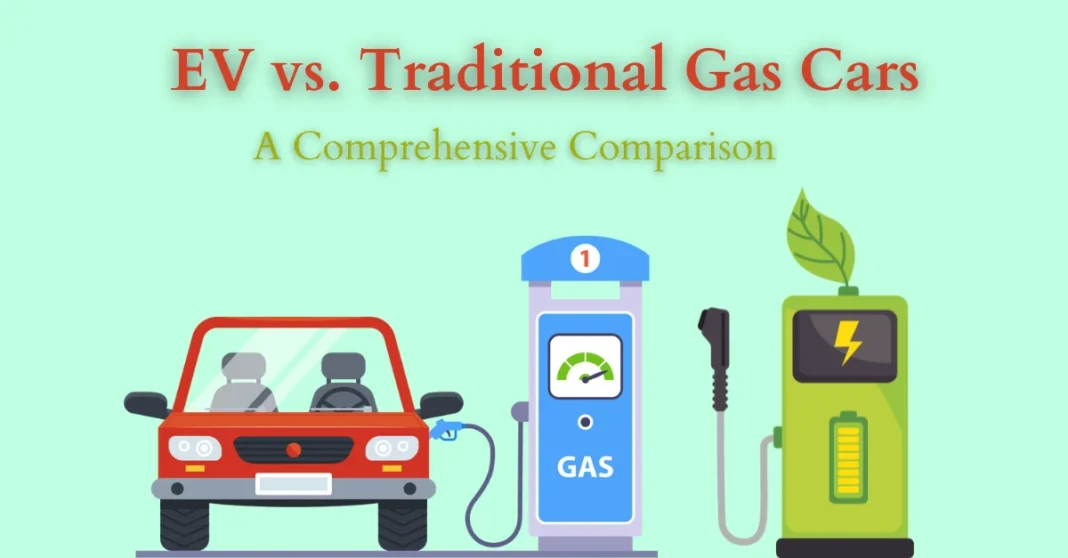As the automotive industry undergoes a major shift toward sustainability and innovation, electric vehicles (EVs) and traditional gasoline-powered cars are two of the most talked-about options. But how do they really compare? Let’s break it down in terms of key factors that matter to consumers today.
1. Environmental Impact
EVs:
- Electric vehicles produce zero tailpipe emissions, making them a much cleaner option for the environment, especially in reducing air pollution in urban areas.
- Even though EVs require electricity for charging, the carbon footprint is significantly lower when the power comes from renewable sources like wind or solar.
- Lifecycle emissions are also lower, as battery production and disposal technologies are improving.
Gas Cars:
- Traditional cars run on gasoline, which emits carbon dioxide (CO2) and other harmful pollutants like nitrogen oxides, contributing to climate change and air quality issues.
- The extraction, refining, and transportation of oil also have a large environmental impact, adding to the overall carbon footprint of gasoline-powered vehicles.
2. Fuel Efficiency and Cost
EVs:
- Electric cars are far more efficient than gasoline cars in terms of energy use. On average, EVs convert over 85% of electrical energy into movement, while gasoline engines only convert about 20% of the energy in fuel into power.
- Charging an EV is generally cheaper than fueling a gasoline car, especially if done at home. In the U.S., the cost per mile for an EV can be less than a third of that for a traditional gas car.
- However, long-distance driving in an EV requires planning for charging stations, which can be less convenient than simply stopping for gas.
Gas Cars:
- Gasoline engines tend to be less efficient, meaning they use more energy to travel the same distance as an EV.
- Fuel prices fluctuate and can be significantly higher than electricity, making long-term operating costs more expensive.
- Refueling a gas car is fast and convenient, with gas stations widely available, even in remote areas.
3. Maintenance
EVs:
- Electric vehicles have far fewer moving parts than traditional gasoline cars. This means less wear and tear and fewer components that require regular maintenance (like spark plugs, fuel filters, and oil changes).
- The main maintenance concern for EV owners is battery health, though batteries are designed to last many years, and many manufacturers offer warranties of 8-10 years or more.
- Brake maintenance may also be less frequent due to regenerative braking, which helps recharge the battery and reduces brake wear.
Gas Cars:
- Gasoline vehicles require regular maintenance such as oil changes, exhaust system repairs, and routine engine checks. Over time, these can add up to significant costs.
- Components like the transmission, cooling system, and fuel system also require attention, leading to more frequent and expensive visits to the mechanic.
4. Performance
EVs:
- Electric vehicles are known for their smooth, quiet ride. They provide instant torque, which translates into quick acceleration and a responsive driving experience.
- Many modern EVs offer performance models with sportscar-like acceleration and handling, challenging traditional performance vehicles.
Gas Cars:
- Gasoline-powered vehicles can also offer impressive performance, especially with higher horsepower engines in sports and luxury cars.
- However, they often lack the immediate acceleration and smoothness that an electric motor can provide, especially in lower-end models.
5. Range and Refueling
EVs:
- The range of electric vehicles has been steadily increasing, with many modern EVs capable of traveling over 250-300 miles on a single charge.
- Charging an EV at home can take several hours (depending on the charger and battery size), but fast-charging stations can reduce charging times to around 30-60 minutes for up to 80% charge.
- Long road trips may require more planning to locate charging stations, especially in rural areas or during peak travel times.
Gas Cars:
- Traditional gas-powered cars can typically travel 400-600 miles on a full tank, depending on the model and fuel efficiency.
- Refueling is quick and convenient, taking just a few minutes at any gas station, which remains one of the biggest advantages over EVs for long-distance travel.
6. Upfront Cost and Incentives
EVs:
- The upfront cost of an electric vehicle can be higher than that of a comparable gas car, primarily due to the cost of the battery.
- However, government incentives, rebates, and tax credits (such as the U.S. federal EV tax credit) can significantly reduce the initial price.
- Over time, the cost savings in fuel and maintenance can make EVs more economical in the long run.
Gas Cars:
- Gasoline vehicles generally have a lower initial purchase price compared to EVs, which may make them more accessible for budget-conscious buyers.
- However, higher fuel and maintenance costs can offset these savings over the vehicle’s lifespan.
7. Resale Value
EVs:
- While EV resale values are still emerging in the market, they are expected to stabilize as the technology matures and demand grows.
- Battery depreciation can affect the resale value, but many manufacturers are addressing this with longer battery warranties and increasing efficiency.
- As the market for used electric vehicles grows, their resale value is likely to improve.
Gas Cars:
- Gasoline-powered cars have a well-established resale market, with a vast network of buyers and sellers. However, as EV adoption rises, the demand for used gas cars may gradually decrease.
- Older gas cars may also see lower resale values due to stricter environmental regulations and rising fuel costs.
8. Driving Experience and Technology
EVs:
- Electric vehicles often come with the latest tech features, including advanced driver-assistance systems (ADAS), over-the-air software updates, and intuitive infotainment systems.
- Some EVs offer features like autopilot or semi-autonomous driving capabilities, pushing the boundaries of modern driving.
- With low noise levels and a futuristic design, EVs often offer a unique driving experience that contrasts sharply with traditional vehicles.
Gas Cars:
- Gasoline vehicles may not offer the same level of cutting-edge technology as EVs, but many come with high-tech features like infotainment, adaptive cruise control, and safety features.
- Driving a gas-powered car is often seen as more “traditional,” with a more familiar engine sound and driving feel.
Conclusion: Which Is Right for You?
- Go for an EV if you want to reduce your environmental footprint, save on long-term costs, and embrace modern technology. They’re an excellent choice for daily commutes, city driving, and eco-conscious consumers.
- Stick with a gas car if you prioritize long-range driving, fast refueling, and a lower upfront cost. Gasoline vehicles remain practical for those who need flexibility for long-distance travel or who are not ready to make the switch to electric just yet.
Both EVs and traditional gas cars have their pros and cons, but as the EV market continues to grow and technology advances, the gap between the two is narrowing, making electric vehicles an increasingly viable choice for all types of drivers.
#EVvsGasCars #ElectricVehicles #GasVsElectric #SustainableDriving #SustainableDriving #GoElectric #ElectricCarComparison

